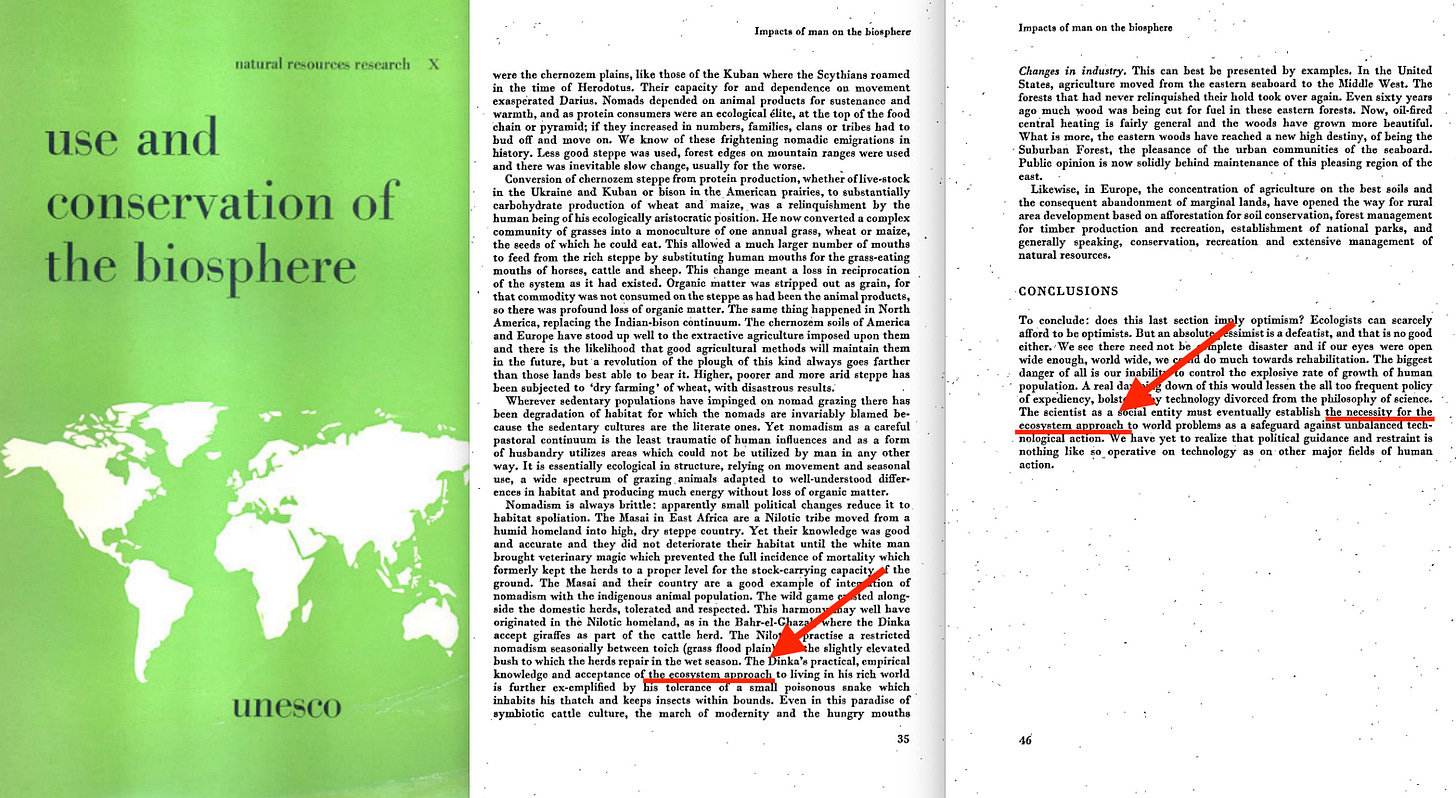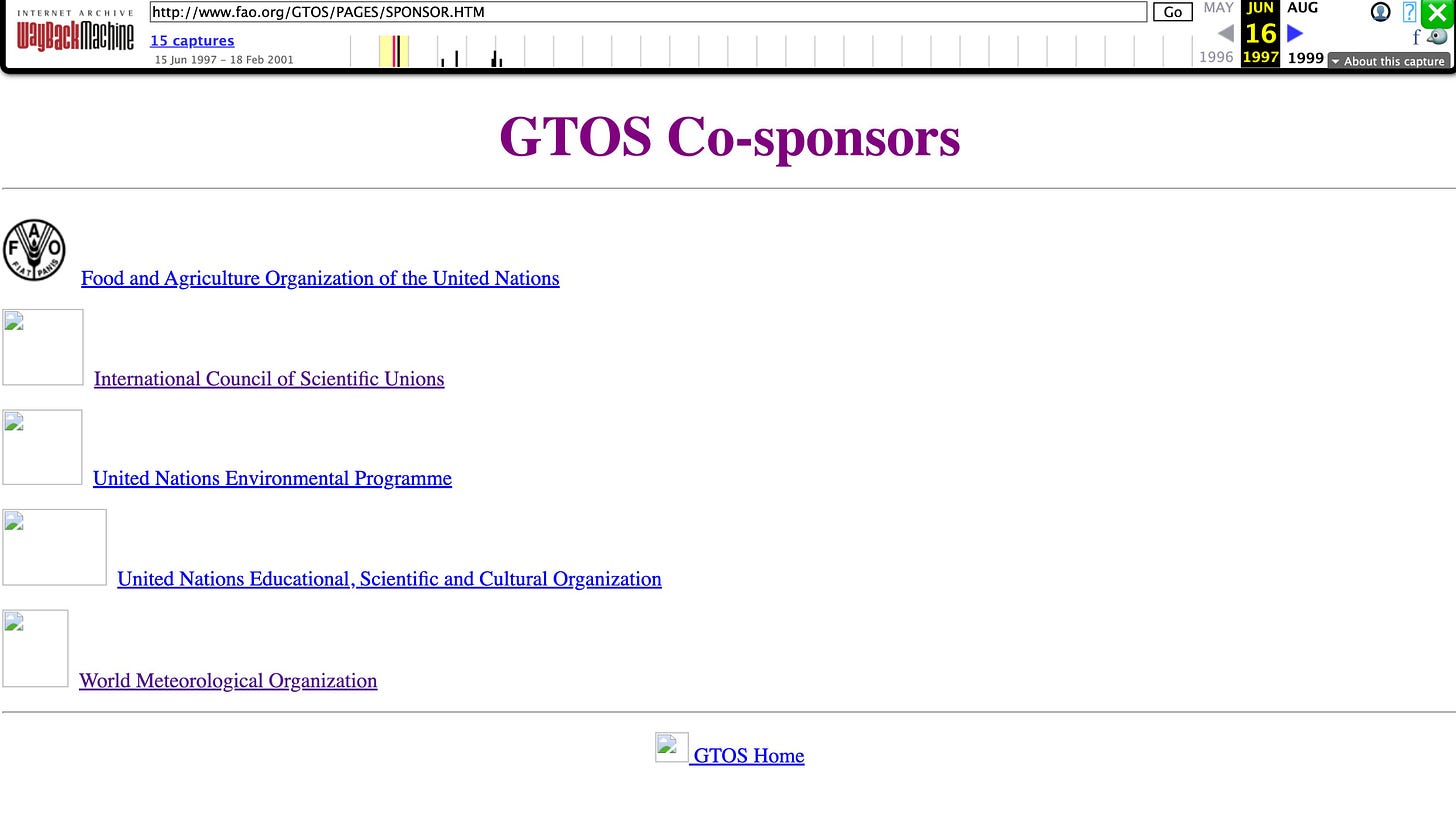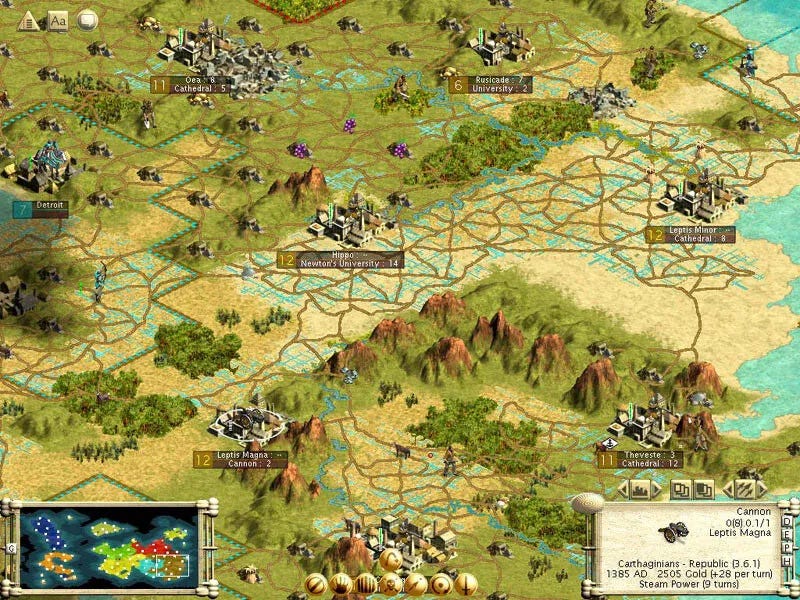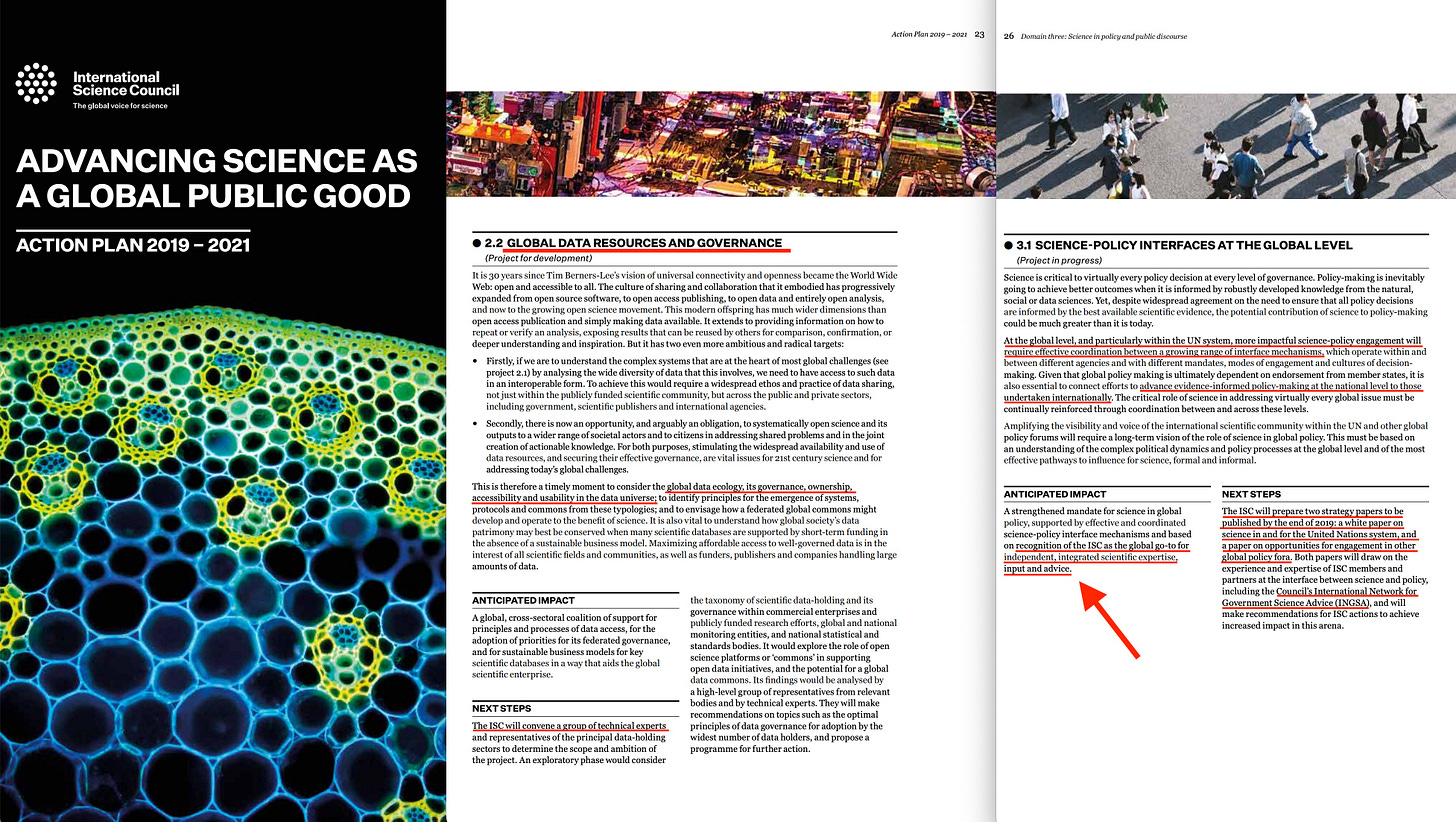New World Science
1957 saw the launch of the International Geophysical Year.
And you will never guess whose initiative that was.
The International Geophysical Year encompassed eleven Earth sciences. But more notably, it during the early days of the Cold War represented somewhat of a global reconcilliation in terms of science, as even the Eastern Bloc joined the efforts.
Sputnik, for instance, was released as part of the event.
And true to form, the International Council for Science were the initiating force behind the initiate, which spawned the beginnings of a brand new ‘science’ with material impact for generations down the line, and I quote - ‘While greenhouse gases were not its key priority, the IGY provided funding to initiate the systematic measurements of atmospheric carbon dioxide‘.
Yup, it’s another one of those coincidences involving the ICSU, and what’s rather spectacular in that regard, is that those coincidences just keep coming.
The IGY also yielded the Global Atmospheric Research Program - GARP - in 1967, which looped in continuous satellite monitoring, and the use of computers for this purpose. The ICSU, yes, they were there.
A next major initiative of the ICSU followed through the International Biosphere Programme (IBP), which ran from 1964 to 1974. And this project came well in handy, as UNESCO went on to host what might have been one of the most important conferences in world history in Paris, 1968.
The conference in question was the ‘Use and Conservation of the Biosphere’, and the proceedings thereof was the first major document to include a mention of the ‘Ecosystem Approach’, though exactly what that was, remained unclear.
In reality, however, these Ecosystem Approach were early reference to what was (3 decades) later defined as the new political management system, ultimately describing technocracy. But the proceedings also carried specific recommendations, including -
Mention of environmental change, and its relevance to zoonotic disease.
Natural resource inventories, and global, standardised reporting.
Coordinated research, exchange of information, and regional databases.
Pollutants in the atmosphere, which called for ‘monitoring’ worldwide.
Conservation.
A recommendation which could lead to a call for genetic sequencing of nature itself followed, as well as a call for global governance of land-use in the conclusion, and finally, a request to issue a special edition of the UNESCO Courier, ‘educating’ the populace in this new initiative.
In terms of gravitas, the report quite simply was astonishing, as a whole range of initiatives were subsequently launched.
Recommendation 1 further - explicitly - drew in experience gathered via the ‘International Biosphere Programme’, and the IBP further yielded the ‘Man and the Biosphere Programme’ programme launched by UNESCO in 1971, which in turn led to the ‘UNESCO World Network of Biosphere Reserves‘.
And these - in addition to the UNESCO World Heritage sites - now include around 8% of all land on the planet.
Back back to 1969 , because the Biosphere conference called for ‘global monitoring’ (aka ‘global surveillance’), and this resulted in the launch of SCOPE… by the ICSU, of course.
SCOPE penned two reports, the latter was released in 1973 and titled the ‘Global Environment Monitoring Systems’, which ultimately developed into the GTOS, GEOSS, GEO BON, and ultimately GBIOS - global surveillance for sakes of saving the environment, with integrated satellite data - but their role was yet to conclude.
Because the climate narrative was only getting started, and in 1978 ISCU once again were drivers, as the pioneering World Climate Conference launched. An event that ‘confirmed the long-term significance of atmosphetic CO2 levels for global climate’.
And in that regard - the 1979 event was by invitation.
In 1985, at yet another invitation-only event, the 'best scientists available’ agreed that ‘greenhouse gases could warm the earth by several degrees’, which together with yet another SCOPE report, stated that human activities would lead to substantial warming., and hence a call for governments to introduce measures for sakes of energy conservation, and the curtailing of greenhouse gas emissions.
A few years later (1989), Al Gore penned the article titled ‘The Global Environment: A National Security Issue‘, which amongst a litany of ridiculous and absurd predictions, considered a ‘5 degree raise in temperatures in the lifetime of our children’ realistic.
The SCOPE report also ‘shaped the recommendations of the 1987 Brundtland Report “Our Common Future” on action to protect the earth’s climate‘.
This conference then led to yet another initiative - the Advisory Group on Greenhouse Gases - which was ‘an antecedent of the Intergovernmental Panel on Climate Change’. And the first chairman of this new group was to become none other but the author of this SCOPE report - Bert Bolin.
Yes, really. The IPCC was front-run by the AGGG - with undeniable links to SCOPE and hence the ICSU yet again.
The ICSU then went on to sponsor the International Geosphere-Biosphere Programme, which produced a scientific action plan for improved prediction of global climate change, and which involved… the establishment of the Global Territorial Observing System., which ultimately led to the use of satellite data for monitoring purposes.
And while Bert Bolin’s IPCC’s first report led to the establishment of the UNFCCC at Rio in 1992, the second led to the Kyoto Protocol in 1995.
But the UNFCCC were not the only disaster launched at Rio in 1992; the other one of significance was the Convention on Biological Diversity. And just prior, DIVERSITAS launched. In fact, and I quote -
‘These findings also contributed to the Global Biodiversity Assessment, an initiative of the World Resources Institute, and to the work of the Convention on Biological Diversity, established in 1992, and with which DIVERSITAS has a Memorandum of Understanding‘
And as for those wondering -
‘DIVERSITAS was established in 1991 by three international organisations, the United Nations Educational, Scientific and Cultural Organization (UNESCO), the Scientific Committee on Problems of the Environment (SCOPE) and the International Union of Biological Science (IUBS),‘
In case you wonder - both SCOPE are IUBS are explicitly tied to ICSU, who in fact joined only few years later -
‘In 1996, DIVERSITAS welcomed two new sponsors, the International Council for Science (ICSU) and the International Union of Microbiological Societies (IUMS), and added nine additional projects to its portfolio‘
… and yes, the IUMS are ICSU members as well. As for the nine additional projects, ‘monitoring of biodiversity’ was one, which is of particular interest, given what later took place in phase 3 -
‘Since mid-2009, and in the light of the changes in the biodiversity science-policy landscape (establishment of a Biodiversity Observing Network - GEO BON, consultation on an Intergovernmental science-policy Platform on Biodiversity and Ecosystem Services - IPBES, and launch of the ICSU Visioning process),‘
GEO BON of course is a direct link to the global surveillance network contructed, and as for IPBES...
Well, IPBES officially launched in 2012, following a UN General Assembly 2010 resolution. And in the middle of those two dates, the IUCN released the following note on the ‘IPBES Stakeholders Day’ -
… of course the ICSU are right in the centre of things, as per usual. And as for what they get up to, well, it really is rather simple.
And who will pay? Yes, keep asking yourself that, as you yet again find your ‘elected representatives’ ‘forced’ to raise taxes, on a background of increasing inflation courtesy of central banks easing to infinity. After all, the figure is no less than $200bn/yr by 2030 in order to ‘save the planet’ via the Convention on Biological Diversity driven agenda.
And this advice is actually taken up. Here’s an official EU document from late July, 2023, titled ‘Guidance on the Development of Public and Private Payment Schemes for Forest Ecosystem Services‘. Yes, in the future, simply owning a forest will yield you an income. Well, owning one, or licensing the rights to the ‘ecosystem services’ provided by a UNESCO Biosphere Reserve, through the Global Environment Facility, to be wrapped up in a Natural Asset Company and floated on the NYSE, thereby ensuring that the money extracted by a struggling population ends up in the pockets of those who front-run these policies decades ago.
It sure is a good thing that ‘fact’ ‘checkers’ stated that Lenin never said anything about ‘grinding the middle class against the millstones of inflation and taxation’, because it sure could have fooled me, given contemporary experience.
Thanks, ‘fact’ ’checkers’.
And this is where the article on the New World Economics enters the frame. Because there’s a whole economy setup around this concept - ecosystem services, and the valuation there of. Only thing is - it’s pricing the unknowable. We can’t even predict the path of a single ant, crossing a tile on a summer’s day, yet, this pseudoscientific field promises to not only price ‘biodiversity’ correctly, but also factor in interconnections between biota, and the genetic diversity in between. The complexity here quickly escalates towards the infinite, but don’t worry, because they have the solution handy; a carefully penned guide, through which you learn that each ‘landscape’ only has a finite set of types and states. The infinite set of possibilities has been severely reduced - to less than 100.
No, really. The central planners clearly spent more time in university playing Sid Meier’s Civilization that actually learning, or thinking critically.
Perhaps that’s why they now work with the International Science Council.
-
But wait - we’re not done. No, we are really not done. There’s an almost infinite amount of material I could further add here, like their involvement in the little known ASCEND 21 report which influenced Rio 92, and hence Agenda 21 greatly. Or that said Agenda 21 also includes specific wording relating to GEMS and GRID - ie, the global surveillance system. Or I could detail how their 1966 Committee on Data for Science and Technology (CODATA) was early work on data standardisation, which also came in handy for the 1968 Biosphere conference organised by UNESCO.
I have to cut it short, however. So I’ll finish off with a final example of their ‘work’. In 1996, the ISCU launched a new initiative titled the SCRES; the Standing Committee on Responsibility and Ethics of Science. Their initiative was fairly clear. To silence scientists, through a top-down ‘ethics’ framework, which could easily be abused, leading to a situation where it was much easier to simply stay quiet and go along with the plan… oh wait, weren’t doctors fired for speaking up during the scamdemic?
And UNESCO? They launched their similar efforts - in 1998.
Yet again, the ICSU had front-run the ‘science’.
The ISCU, however, soon moved on. They shut down the SCRES, and instead launched the Committee on Freedom and Responsibility in the conduct of Science. And they, in 2008, release a brochure outlining not only the freedom, but also the responsibilities of scientists -
‘As members of the larger scientific community, scientists are expected to be impartial and fair in assessing both their own work and that of their colleagues, and to be respectful and ethical, particularly when dealing with human subjects or animals or when research involves toxic substances that could be harmful to human health or the environment…‘
Who would decide when said ‘ethics’ would apply - and who would even define it? The right to speak out was being gradually curtailed.
‘Interactions between science, society and policy are crucial in the domain of public health and emerging infectious diseases. Global alerts for diseases such as the Severe Acute Respiratory Syndrome (sars) and avian influenza have been widely publicized in recent years.‘
But what if all of that information was outright fraudulent?
‘As part of an open forum, scientists, representatives from the pharmaceutical industry and the health policy sector engaged in joint discussions on the role of scientists who generate the tissue samples or data in the first instance and on the most effective mechanisms to link science and policy in crisis situations.‘
In other words, ‘should an emergency (pandemic) strike, how do we silence the scientists, sell vaccines produced without a proper testing protocol, and push through a technocracy’. And no, this interpretation isn’t rather as alarmist as you might believe, because should we go back up to their outlined vision, we find -
‘The long-term ICSU vision is for a world where excellence in science is effectively translated into policy making and socio-economic development.‘
Except, of course, that should that the ICSU be utterly corrupt to the core, refuse to take responsibility where it matters most (like, for instance, the Replication Crisis), and always seek exemptions to the rules themselves, then we suddenly find ourselves in a situation where they demand others take the responsibility they refuse. In short - they seek to hold executive power, yet with no accountability.
In fact, were they utterly corrupt, you would have a prime spot for people with dreams of a global dictatorship, hiding under a veneer of ‘science’ to occupy.
And for the record - the answer is point blank ‘NO’. If they seek to channel their ‘science’ directly into ‘policy’ then they should absolutely be held responsible for adverse impacts - no exception. But they will never, ever, ever in a trillion years accept that, and there is a reason for that, and it’s the same reason why they now actively write and recommend policy for the ‘decision-makers’.
The ICSU (ISC) should, in my book, be meticulously investigated for corruption - and that, the sooner the better. And all papers located during said investigation should immediately be made available to the public - with NO exception, and with NO redactions - because after all, the ICSU themselves claim to be all about transparency.
Besides, if they have done nothing wrong, why would they object?
But back to their utterly self-serving documents on ‘rights’ and ‘responsibilies’ - because naturally, these should be followed by ‘ethics declarations’, which then can be used to prosecute those speaking up.
In fact, alleged ethics violations were a common sight during the scamdemic.
However, when the ‘ethics panels’ make judgments which are clearly wrong, often acting upon outright fraudulent information, who will take responsibility? And the answer to that question is clearly not the ICSU or associated unions, because their ‘exemptions’ to the rules are also well documented through the material, ICSU through proxies have fabricated.
So what does the future hold? The answer to that question is - should they get their way - ‘whatever the ICSU dictates is science’. Because while they refuse to be held to account, refuse to discuss medical findings, and refuse to to allow dissenting scientists to speak up, they expect their hastily produced non-replicable ‘science’ to be translated into policy.
… and that, especially during an ‘emergency’.
The final chapter here is that of free speech in general. A topic, which people like Thierry Breton has led an onslaught against, and where Facebook-funded ‘fact checkers’ play a key role - again with absolute impunity. It’s the final hurdle towards establishing the technocracy of which they’ve dreamt for generations.
To protect you.
-
More information on the 1968 UNESCO conference on the biosphere -
Scope’s first reports on the global surveillance system -
On the ICSU, and their own questionable ethic and moral values -
And the GEF, acting the conduit for monetising biosphere reserves -










































